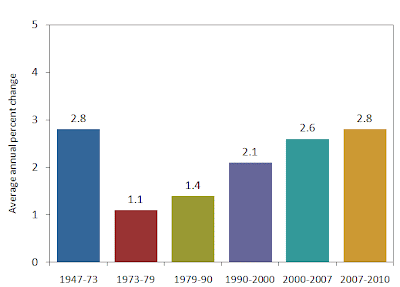
Economics, as a branch of the more general theory of human action, deals with all human action, i.e., with mans purposive aiming at the attainment of ends chosen, whatever these ends may be.--Ludwig von Mises
Saturday, July 9, 2011
Monday, April 11, 2011
Tuesday, March 1, 2011
Monday, July 19, 2010
US Manufacturing
Thursday, October 1, 2009
Cartoon: Phones and Productivity
Saturday, August 23, 2008
Wednesday, June 18, 2008
Cartoon: Sports and Workplace Productivity
Sunday, March 16, 2008
Manufacturing Productivity
Monday, March 3, 2008
NAFTA: Charts


Despite all of the political rhetoric about NAFTA, free trade and globalization causing U.S. job losses in manufacturing, one of the most significant factors in the recent decline of American manufacturing jobs is the significant increase in productivity of U.S. workers. Manufacturing output and productivity in the U.S. are both at all-time highs - we're able to produce more and more output with fewer and fewer workers.
Although some manufacturing jobs are gone forever, we're much better off as a country to be able to get increases in manufactruing output with fewer workers, just like the productivity gains in agriculture that eliminated millions of farming jobs. In the long run, we are much better off with fewer jobs in the farming sector producing an increasing amount of agricultural output, and likewise, we'll be better off in the long run with fewer workers in the manufacturing sector producing an increasing amount of output.
Mark Perry at Carpe Diem
Free trade is good. Productivity growth is good. Clinging to the past bad.
Monday, September 3, 2007
U.S. Workers: World's Most Productive
The average
The
…a Chinese industrial worker produces $12,642 worth of output - almost eight times more than in 1980 - a laborer in the farm and fisheries sector contributes a paltry $910 to gross domestic product…
The difference is much less pronounced in the


 source
source




